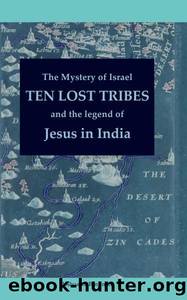The Mystery of Israel's Ten Lost Tribes and the Legend of Jesus in India by Joshua Benjamin

Author:Joshua Benjamin [Benjamin, Joshua]
Language: eng
Format: azw3
Published: 2013-05-30T16:00:00+00:00
8 The Lost Tribes and Buddhism
It is no easy task to trace the Lost Tribes dispersed nearly 3000 years ago and their possible contact with Buddhism. Close similarity is observed in the religious doctrine and rituals of Buddhism, the Essenes and Christianity. The Lost Tribes may have been attracted to the Buddhist philosophy which emphasizes the brotherhood of mankind, peace and the oneness of the universe.
Sensing the whereabouts of these Lost Tribes, Jesus sent the twelve apostles out with the following instructions: ‘Do not take the road to the Gentile lands, and do not enter any Samaritan town; but go rather to the lost sheep of the house of Israel.’
The Jesuit Fathers, Grueber and Dorville, who were among the earliest travellers in Tibet, returned from China via Tibet in 1661 CE—about 400 years after Marco Polo passed through Tibet. They have written about the similarity they noticed in the doctrine of Buddhism, as also the rituals of the Buddhists with those of their Romish faith.
Grueber noticed that the dress of the Lamas resembled the dress of the Apostles. The discipline of the Buddhist monasteries and the different orders of the Lamas bore the same resemblance to the Romish Church. Grueber observed that the Lamas made suffrages, alms, prayers and sacrifices for the dead like the Roman Catholics. The notion of incarnation was common to both, as also the belief in paradise and purgatory. The Buddhist Lamas had monasteries filled with nearly 30,000 monks and friars near Lhasa. They made their vows of poverty, obedience and chastity like Roman monks. The Lamas had confessors licensed by the Superior Lamas who were empowered to receive confessions and to impose penances.
It is interesting to note that in the life of the Buddha, many details coincide with the life of Jesus.
Sakyamuni (the Buddha), it is believed, came from heaven, was welcomed by angels and was received by an old saint who was endowed with prophetic vision.
There are many common phrases in the Psalms of David and the Psalms chanted by the Buddhist monks.1
The priests and congregation sing alternate verses in honour of Godama praising him as the Saviour from sin; thus imitating the character in which the Messiah is predicted in the Psalms and some parts of the Old Testament.
Priest : The Illuminator of the world has arisen; the world’s protector, the maker of light, who gives eyes to the world that is blind, to cast away the burden of sin.
Congregation : Thou hast been victorious in the fight; thy moral excellence has accomplished thy aim; thy virtues are perfect; thou shalt satisfy men with good things.
Priest : Godama is without sin; he is out of the miry pit; he stands on dry land.
Congregation: Yea, he is out of the miry clay; he will save others.
These prayers seem to be a response on behalf of Godama and resemble the prophetic Psalms:
1. See The Lost Tribes by Dr George Moore, Longman Green, Longman and Roberts, London (1861)
80 • THE MYSTERY OF THE LOST TRIBES He
Download
This site does not store any files on its server. We only index and link to content provided by other sites. Please contact the content providers to delete copyright contents if any and email us, we'll remove relevant links or contents immediately.
Genius & Anxiety by Norman Lebrecht(802)
A Chosen Few by Mark Kurlansky(781)
Going Home by Raja Shehadeh(680)
The Aleppo Codex: A True Story of Obsession, Faith, and the Pursuit of an Ancient Bible by Matti Friedman(674)
Righteous Victims by Benny Morris(672)
A history of Zionism by Walter Laqueur(668)
The War Against the Jews: 1933–1945 by Lucy S. Dawidowicz(646)
Complete Works of Josephus by Josephus(620)
The Israel-Arab Reader by Walter Laqueur(588)
Legacy by Thomas Harding(579)
Rome and Jerusalem : the clash of ancient civilizations by Goodman Martin 1953-(575)
The Rise of the Roman Empire (Classics) by Polybius(561)
We Stand Divided by Daniel Gordis(539)
Tehran Children by Mikhal Dekel(513)
The Secret History by Procopius(513)
A History of Zionism by Walter Laqueur(507)
Ethics (Translated & Annotated) by Baruch Spinoza(502)
Jewish Terrorism in Israel by Pedahzur Ami & Arie Perliger(500)
Hitler's First Victims by Timothy W. Ryback(491)
